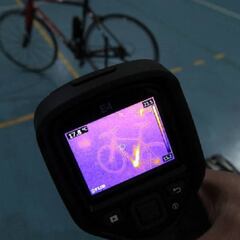Alberto Contador interview: "I bet on football to buy a new bike"
The two-time Tour de France winner visited Diario AS to discuss about his career in a two-part interview.
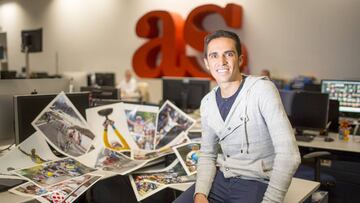
Alberto Contador is one of the most decorated cyclists of the last decade. The Madrid-born climbing specialist has won the Tour de France twice (2007, 2009), the Giro d'Italia twice (2008, 2015), and the Vuelta a España on three occasions (2008, 2012, 2014). As such, he forms part of a small circle of cyclists to have won each of the Grand Tours.
The 34-year-old stepped off the saddle for good in September 2017 after a 14-year professional career.
Contador visited Diario AS and in the first section of a two-part interview, he speaks about his beginnings in cycling, who he looked up to, and how he bet on the football in an attempt to buy a new bike.
Contador: "early years helped me value what would come later"
Was there a tradition of cycling in your family?
It was through my older brother. I started late. I played all sorts of sports before: athletics, football… As a kid I had a bike with stabilisers that I started to ride. I used to go around in circles until the stabiliser broke on one side. Then I started to go around in circles the other way until the other one broke. That was how I learnt.
Was your father a cycling fan? Was the Tour de France on TV in your house?
No chance. He liked football and that’s why I’m a Real Madrid fan. He would go to the bar to watch their matches and I liked to go along with him. I began to watch cycling because my brother brought home videos of races. He lent me my first bike, a mountain bike. Later I inherited an old Orbea [a Spanish road bike].
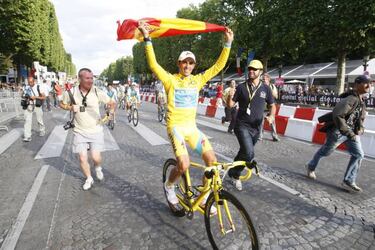
How did you get in to it?
I started to go with him [my brother] and a group that he went out with. I remember that we did time-trials, the results of which we knew a few days later. […] In one of the first I finished five seconds behind him.
And you carried on until you beat him…
I have a story about that. There was a time-trial that was organised from Titulcia to Chinchón. I remember drilling the handlebars on the bike to put horns on them. When the results came out, they said that he had beaten me by five hundredths of a second! I think he modified that result somehow. I’ve never found out the truth about whether I actually beat him.
How do you reflect on those years when you first became hooked?
I think that those early years helped me to value everything that would come later. My team-mates had good bikes… And I remember betting on the football pools in the hope that I would win and be able to buy myself a good one! I spent a lot of afternoons listening to the matches and thinking about the bike.
"I have a museum for my bikes"
What relationship do you have with your bikes?
I have kept hold of that Orbea. I have a kind of museum with 42 or 43 bikes from throughout my career. If you were to ask me about the jerseys, I’d have to look for them. But I have hung on to the bikes, from the first one to the last one. [Alberto takes out his phone and shows photos of his collection]
What did your family think when of you dedicating yourself to cycling?
My mother still tells me that her son being a cyclist doesn’t make up for the tension she has experienced and the fear that I’ll fall off. My grandad asked me back at the start what I would dedicate myself to, and I said riding bikes. And he said to me: “I know that already, but where are you going to work?” Later, that changed, and imagine how much I showed off as a grandson when I won the Tour.
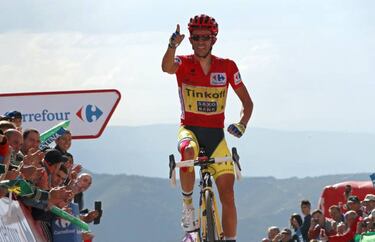
When did you start to stand out as a climber?
Since I was young I was nicknamed ‘Pantani’ [after Italian climbing specialist Marco Pantani] because I climbed more than anyone, but later I would lose it all on the descent. In my early years as a professional, in a Vuelta a Valencia, I was on top with another cyclist, and on the way down to the finish he left me behind. My director said to me: “Today I’ve seen something that I have never seen in my life. How can you descend so badly!”
How did you overcome that?
It’s all in the head. The key is to descend under control.
Pantani and Armstrong were examples
Who was your point of reference when you started?
[Marco] Pantani and [Lance] Armstrong. I saw Pantani in videos more than anything else. But what I wanted was to win the Tour, and because of that I concentrated on Armstrong.
You later experienced a difficult situation when you and Armstrong were part of the same team [Astana]…
It was difficult. I came to win the Grand Tour events [The Tour de France, the Giro d’Italia, and the Vuelta a España], but he [Armstrong] came back and it wasn’t clear who was the leader. [Johan] Bruyneel [Astana team director 2008-09] had more of a relationship with him and for the team he was more profitable.
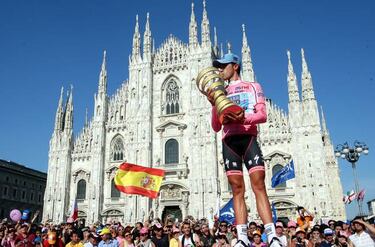
Do you get on well with your rivals?
Things happen during competitions, but outside of that the relationships are really good. With [Chris] Froome, for example, we respect each other and we don’t have any problems. [Alberto gets his phone back out and shows a picture of him and Froome in a bar]
You’ve now retired from cycling, but would you consider returning as others have done to mountain biking, for example?
I don’t think so. I prefer to go out on the bike with my group of friends, but the thing is that I want to win everything I take part in.
Are you keeping in shape?
Related stories
I don’t know about all of the details. My weight when I’m fit is 62 kilos, and I tried to stay beneath 67. Now I’ll be four or five kilos above.
The second part of the interview with Alberto Contador will be published tomorrow (Saturday 4 November 2017).


